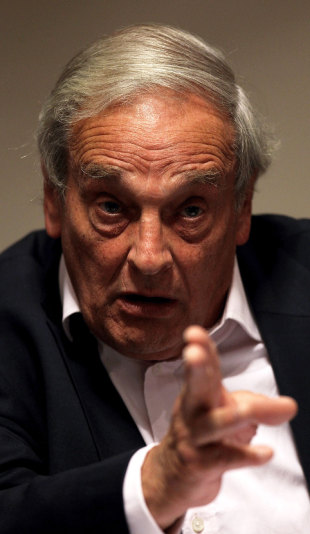|
English Rugby
Blackett report returns to centre stage
Chris Egerton
September 2, 2011

Acting RFU chief executive Martyn Thomas is set to come under further pressure at HQ on Friday
© Getty Images
Enlarge
With England a week away from launching their Rugby World Cup bid in New Zealand, the governing body back home is on the brink of civil war. The Rugby Football Union's management board faces growing pressure to resign from both inside and outside the organisation, as it faces a crucial meeting of the RFU Council. Many of the 62 members of the council are growing increasingly restive at the departure of former chief executive John Steele and the protracted debacle to appoint a performance director. Neither side seems keen to back down unless a last minute deal can be done. Two key items on today's agenda are touchstones for the wider issue of corporate competence and credibility and while they seem dry and dusty, passing or rejecting them will have major implications for the English game. The first will propose keeping acting chairman Paul Murphy in his post until next year's Annual General Meeting. The second is to publish Judge Jeff Blackett's report into the appointment of Steele, his lasting less than a year in the post and the wrangle over the performance director's post which led favourite Sir Clive Woodward to publicly withdraw. Two pages of advice to the council from leading QC Michael Beloff recommend keeping Murphy on, at an estimated cost of around £5,000. If re-appointed, Murphy is not expected to rock the boat, especially the part containing former chairman Martyn Thomas. A source who will attend today's meeting commented, "Murphy's confirmation would stop a rebel candidate sweeping away the old guard, particularly Martyn Thomas, but it would be a paper-thin defence. Love him or loathe him, how he resigns as chairman and then remains as England's IB representative, involved in the 2015 World Cup and becomes acting chief executive, getting himself a significant pay rise in the process, is masterful." The rebels see the second as much more significant, in terms of removing Thomas. When produced in July, the Blackett Report reportedly urged the resignation of Thomas from all of his roles, as well as the elected members of the board. The report examines the whole sequence of events which has led England into the morass of leak and counter leak. As well as the much leaked recommendations, it is understood that there are some fascinating pictures of the RFU's board at work. Sources reveal Thomas was strongly advised not to appoint Steele in the first place, before the ex-Northampton director of rugby was confirmed in June 2010 as the successor to Francis Baron. But Blackett allegedly criticised the board for "failing to brief that [headhunting] company adequately" and the CEO interview panel, headed by Thomas, may not "have probed the perceived weaknesses of each candidate in sufficient detail." Those weaknesses allegedly included insufficient "political skills… required within an organisation that was resistant to change." The review reportedly goes on to dismiss Thomas' criticisms of Steele, suggesting they are based on "hearsay." The report also allegedly includes further criticism of Thomas for contacting one of the panel members involved in appointing the RFU's performance director as well as one of the candidates. Steele was also apparently brought to task, but the report suggests the process was "driven by media interest, the lobby for one particular candidate and poor governance by the board." The board are also allegedly slammed as a whole for "interfering too much with the day-to-day running of the Union, rather than standing back and holding the executive to account." In the latest development, the RFU have sent a legal letter has been sent to all council members outlining the possible ramifications of publishing the Blackett report. The Daily Telegraph reports Deputy High Court judge Robert Englehart, QC, has urged members to end their action. His letter reportedly says, "The material on which the report is based... could well give rise to a complaint of unfairness by those adversely affected. The report is couched in terms of 'evidence' and 'testimony' . However there was no real evidence or testimony as such would be normally understood in law...'In my view publication would be inadvisable.'" The RFU's defence in a document sent to Council ahead of the meeting, is that reform is already being carried out, with appointment of a non-executive director close, media relations being reviewed and an external audit of the RFU's governance to be carried out. But I understand this decision was taken after pressure was applied by the Sports Minister Hugh Robertson who is increasingly agitated at recent events. The board are likely to face renewed calls for their resignation whether today's motions are passed or not. "Honourable men would have either resigned or been brought to account by now, but by not publishing the report, the board have done neither," a source explained. "An SGM will be called whether they like it or not, provided they do the decent thing." This saga is far from over. © ESPN Sports Media Ltd.
|
Live Sports
Communication error please reload the page.
-
Football
-
Cricket
-
Rugby
-
- Days
- Hrs
- Mins
- Secs
F1 - Abu Dhabi GP
Abu Dhabi Grand Prix December 11-131. Max Verstappen ()
2. Valtteri Bottas (Mercedes)
3. Lewis Hamilton (Mercedes)
4. Alexander Albon ()
5. Lando Norris ()
6. Carlos Sainz Jr ()
-
ESPNOtherLive >>
Golf - Houston Open
Snooker - China Open
Tennis - Miami Open

